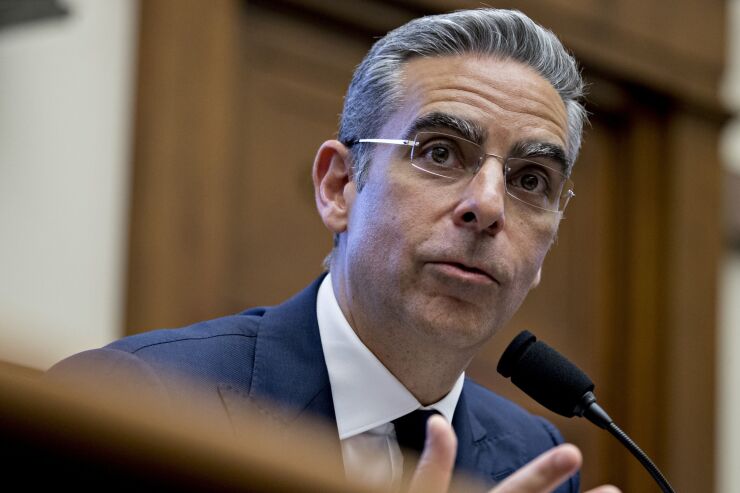Facebook’s financial services chief says the social network is unbowed by the rush of companies into the digital banking market, even as its cryptocurrency wallet and other ventures have yet to get off the ground.
The public’s embrace of digital banking during the pandemic has drawn in new competition, which in turn will attract more consumers to the market and benefit all players, David Marcus said in an interview this week.

"Very few people were talking about stablecoins and central bank digital currencies in the time when we started pushing for what was then
"The reality is our mission really hasn't changed,” Marcus said. “We feel that the current payment structure in the U.S. is antiquated and there's room for improvement."
Marcus said Novi and Diem can power an open, interoperable protocol using blockchain technology and
"I feel like these projects have been put in opposition with the banking industry, but that's not the way I see it," said Marcus, who is also on Diem's board. "If there's a better payment structure and less cost to settle transactions, everyone can benefit."
Facebook's Novi digital wallet, which will support the Diem stablecoin, is approved "in nearly every state" and it would not launch where it is not approved, Marcus said. Novi is scheduled to launch by year-end, he said.
In addition to traditional currency payments, customers will be able to use Facebook's Novi to convert Diem to traditional currency to send to other users. The recipients can convert Diem to traditional currency to make payments, or make stablecoin payments directly to supporting merchants.
Novi will also offer a
The merchant support and inexpensive transactions are part of the lure for banks to support Novi, Marcus said.
Even if consumers open a Novi account, most will want to retain a bank account, Marcus said, adding that can aid the banks' ability to reach new merchants. It can also provide more consumers for bank-supported financial services. There's already a version of this model that predates Novi and Diem. WePay, a subsidiary of
"The banks can cement and reinforce their role through this Novi-Diem payments protocol," Marcus said.
Banks are increasingly partnering with technology companies with large customer bases to speed financial services diversification, a trend called
There are also other stablecoins already in the market ahead of Diem, such as Circle's USDC, which recently surpassed $27 billion in circulation.
Even without approval for a stablecoin, Facebook would have a considerable advantage in building a financial super app. Facebook has nearly
"New accounts aren't opened in a branch or a contact center. They're opened digitally at the end of someone's network. There's no bigger platform than Facebook's products," said Richard Crone, a payments consultant. "Diem with the Novi digital wallet is about creating a new account more than a new currency. Diem represents an unparalleled new distribution channel with global scale and reach."
For Diem, the Novi wallet is the foundation for a super app, starting first with the storage of unused, prepaid balances, Crone said. The San Diego-based Silvergate Bank, which supports minting, burning and storing Diem, "takes center stage as the gateway bank for Diem" Crone said.
Silvergate did not return a request for comment. The $5.6 billion-asset Silvergate is key to Diem's final approval in the U.S. Diem earlier this year
In an earlier interview with American Banker,
"The fact that Diem will be issued by a regulated bank, Silvergate, should allay regulators’ concerns," said Eric Grover, a principal at Intrepid Ventures.
Marcus also contends Diem and Novi to help commercial banks support central bank digital currencies.
The
While CBDCs are still taking shape, there will likely be a role for banks in disbursement. One potential role for Diem would be an integrator of different central bank digital currencies, a use case detailed in a recent
While CBDCs are often positioned as a way to
"We still don't know if a central bank digital currency will become a thing, but the point I'm making is stablecoins don't solve problems by themselves, they serve to build a new infrastructure to make payments cheaper and more accessible," Marcus said.
There's pressure on the U.S. government and private sector to bring new innovations to payments, argues Marcus, contending China's digital yuan is a threat to the U.S. financial system.
"If [the U.S.] is not the one innovating in payments, others will," said Marcus, referencing China's digital yuan project, which is aimed at curtailing the dollar's influence as a reserve currency — as well as big technology firms such as Facebook. "China is powering ahead and its views are not only domestic. They have international ambitions."
The China reference hints at Diem's push to gain final approval from regulators, according to Grover. "It is politically astute of Marcus to reference China," Grover said. "The U.S. is in a cold war with China, and the People's Bank of China has a digital yuan pilot active in 10 cities."
Marcus recently argued legacy payment systems are
"There's no chance that in five years the market is still running payments over an infrastructure that was created in the 1970s and takes three days to clear," Marcus said in the interview. "Banks should be part of this change, and could benefit from faster and cheaper payment rails."





